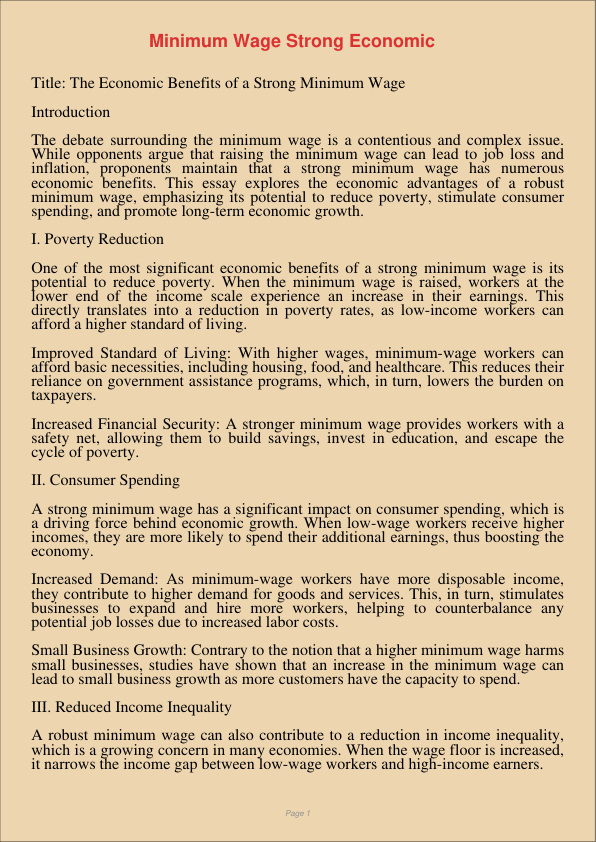Minimum Wage Strong Economic
Jan 12, 2024
minimum wage strong economic
Social science
Biology

Title: The Economic Benefits of a Strong Minimum Wage
Introduction
The debate surrounding the minimum wage is a contentious and complex issue. While opponents argue that raising the minimum wage can lead to job loss and inflation, proponents maintain that a strong minimum wage has numerous economic benefits. This essay explores the economic advantages of a robust minimum wage, emphasizing its potential to reduce poverty, stimulate consumer spending, and promote long-term economic growth.
I. Poverty Reduction
One of the most significant economic benefits of a strong minimum wage is its potential to reduce poverty. When the minimum wage is raised, workers at the lower end of the income scale experience an increase in their earnings. This directly translates into a reduction in poverty rates, as low-income workers can afford a higher standard of living.
Improved Standard of Living: With higher wages, minimum-wage workers can afford basic necessities, including housing, food, and healthcare. This reduces their reliance on government assistance programs, which, in turn, lowers the burden on taxpayers.
Increased Financial Security: A stronger minimum wage provides workers with a safety net, allowing them to build savings, invest in education, and escape the cycle of poverty.
II. Consumer Spending
A strong minimum wage has a significant impact on consumer spending, which is a driving force behind economic growth. When low-wage workers receive higher incomes, they are more likely to spend their additional earnings, thus boosting the economy.
Increased Demand: As minimum-wage workers have more disposable income, they contribute to higher demand for goods and services. This, in turn, stimulates businesses to expand and hire more workers, helping to counterbalance any potential job losses due to increased labor costs.
Small Business Growth: Contrary to the notion that a higher minimum wage harms small businesses, studies have shown that an increase in the minimum wage can lead to small business growth as more customers have the capacity to spend.
III. Reduced Income Inequality
A robust minimum wage can also contribute to a reduction in income inequality, which is a growing concern in many economies. When the wage floor is increased, it narrows the income gap between low-wage workers and high-income earners.
Wealth Redistribution: A strong minimum wage redistributes wealth from high-income earners to low-wage workers. This makes the economic system fairer and less skewed toward the wealthy.
Increased Economic Mobility: By addressing income inequality, a higher minimum wage provides a pathway for low-wage workers to climb the economic ladder and access better opportunities for themselves and their families.
IV. Productivity and Employee Retention
A higher minimum wage can lead to increased employee productivity and reduced turnover. When workers are paid a fair wage, they are more motivated and less likely to leave their jobs, saving businesses money in recruitment and training.
Improved Workforce Stability: Businesses benefit from a stable and experienced workforce, as they can retain skilled employees and maintain consistent operations.
Enhanced Quality of Work: Higher wages can motivate employees to invest more effort in their work, leading to increased productivity and higher-quality output.
Conclusion
A strong minimum wage is not merely a matter of social justice; it also brings substantial economic advantages. It reduces poverty, stimulates consumer spending, and contributes to a more equitable distribution of wealth. Contrary to the concerns about job loss and inflation, a robust minimum wage can promote long-term economic growth by strengthening the purchasing power of low-income workers and increasing the overall stability of the workforce. In this way, a higher minimum wage can be seen as an investment in the well-being of workers and the prosperity of the nation as a whole.